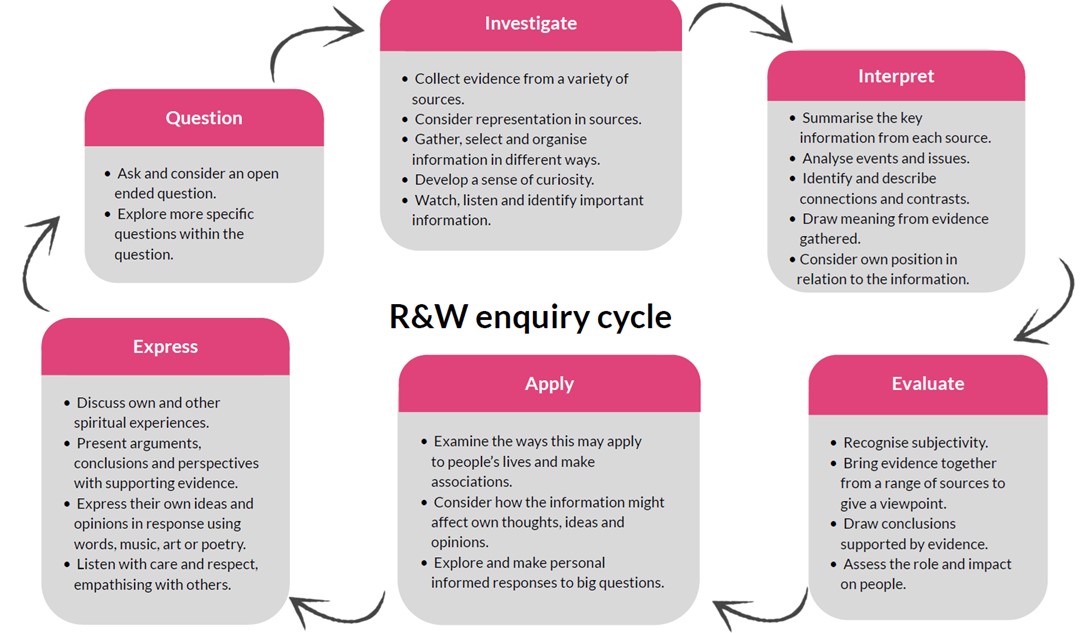Religious Education (RE)
‘RE explores big questions about life, to find out what people believe and what difference this makes to how they live, so that pupils can make sense of religion, reflecting on their own ideas and ways of living.’
The UK has a rich heritage of culture and diversity. Religion and belief for many people forms a crucial part of their culture and identity. Religious Education (RE) has never been more relevant, engaging or challenging, as religion & religious issues are in the news almost every day. For children to be able to understand our constantly changing world, they need to be able to interpret religious issues & evaluate their significance.
At Greenlands, we believe that RE helps children to:
- respect others and gain a broader understanding of views and beliefs;
- improve their knowledge of global affairs;
- develop a stronger sense of wellbeing, ethical standards and personal happiness;
- avoid extremism and religious discrimination;
- contribute to and build a more cohesive community.
At Greenlands Primary School, we value the importance of Religious Education in helping children understand a range of beliefs, developing respect for others, and exploring their own values. However, in line with statutory guidance, parents and carers have the right to withdraw their child from all or part of RE.
If you wish to request a withdrawal of your child from RE lessons, please email office@greenlandsprimary.org.uk at the start of each academic year, clearly stating your reasons. Parents can request withdrawal from all RE lessons or specific celebrations, but not from individual religions within the curriculum. This is in line with government guidance which allows withdrawal from the entire subject, but not selective withdrawal from specific faiths.
Once your request is received, Mrs Cook or Mr Taylor will be in touch to discuss your concerns, explain the RE curriculum in more detail, and support you in making an informed decision. Our RE curriculum is available on the school website for your reference.
Please note that this process must be repeated annually should you wish for your child to continue to be withdrawn from RE.
Children who are withdrawn from RE will be supervised in another classroom and provided with meaningful alternative learning during that time.
RE Intent
At Greenlands, we use Kapow Scheme of Work: ‘Religion and World Views’ to drive teaching and learning in RE. This has been closely matched to The Kent Agreed Syllabus to ensure that it meets all necessary requirements.
The children’s learning is based around an enquiry question which is then answered by looking through the lens of different religions. Through this, children can understand the underlying themes and beliefs common to different religions and draw parallels between their own beliefs and those of others.
Our approach allows children’s critical thinking skills to be developed. It supports and their knowledge and understanding of, and empathy with, people and their beliefs. In turn, this promotes children’s understanding of British Values: Rule of Law, Individual Liberty, Mutual Respect and Tolerance.
How RE is taught at Greenlands
Each term the children are invited to reflect upon a question such as ‘How do we know new babies are special?’ or ‘Why doesn’t Christianity always look the same?’. The diagram below shows how the children develop their thinking and understanding over the topic:

Learning in RE is captured in class floor books. This allows children the opportunity to engage in meaningful discussion and debate.
Outcomes for children
Following their learning in RE, children will be equipped with a range of disciplinary skills and knowledge to enable them to succeed in next stage of their learning. They will be prepared for life in modern Britain, being able to interact with others from different religious and non-religious viewpoints in a respectful, knowledgeable and open-minded way. They will be curious learners who ask questions and make connections, confident to explore their personal worldview and have the skills to appreciate, evaluate and respond to religious, philosophical and ethical questions.
The expected impact of following the Kapow Primary Religion and worldviews scheme of work is that children will:
- Meet the relevant Early Learning Goals at the end of EYFS (Reception) and the End of Key Stage 1 and Key Stage 2 requirements from the Curriculum framework for Religious Education for England.
- Know and understand religious concepts relating to beliefs, practices, community and belonging, and wisdom and morality.
- Develop an understanding of the influence of organised and personal worldviews on individuals, communities, countries and globally.
- Understand some of the ways religions and worldviews are studied (disciplinary knowledge).
- Develop understanding of their relationship with the content studied, being able to talk about their assumptions and preconceptions (personal knowledge).
- Build secure vocabulary which allows them to talk confidently and fluently about their learning.
- Answer questions about worldviews through an enquiry-based approach including investigating, interpreting, evaluating, applying and expressing.
- Talk about the similarities and differences between their own and others’ beliefs with respect and open mindedness.
- Understand the lived experiences of religious and non-religious worldviews to be diverse within and between people and communities.
- Develop an understanding of the ways in which personal and organised worldviews may develop and change across time and place.
EYFS
Learning in RE is sequenced from the very start of Reception. The children are introduced to ideas such as 'what makes us special?'. The following is an overview of the learning and crucial knowledge covered in the EYFS.
Key Stage 1
Learning in KS1 builds on the foundations from EYFS. A variety of religions and worldviews are explored.
Lower Key Stage 2
In Lower KS2, children continue to build on their learning from KS1, exploring religions and worldviews in greater depth.
lower key stage 2 curriculum overview.pdf
Upper KS2
Religions continue to be explored in Upper KS2 around increasingly sophisticated themes such as why religion is different around the world and what happens when we die.
upper key stage 2 curriculum overview.pdf



